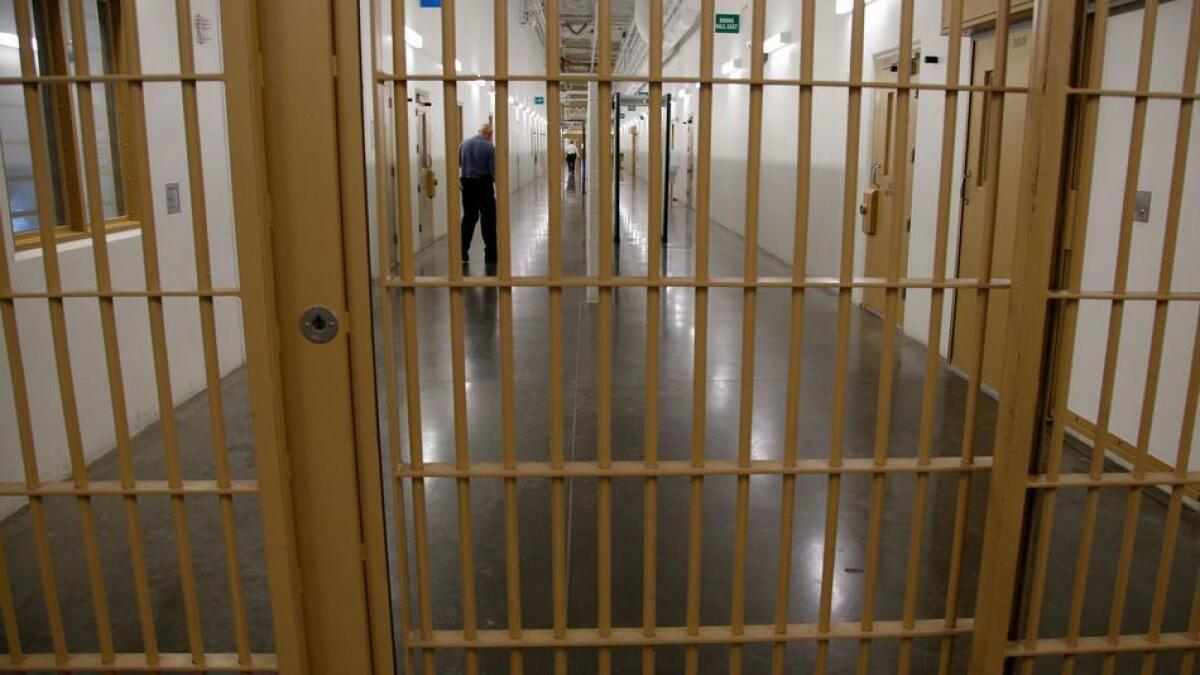Class-action lawsuit alleges immigrants are forced to labor in detention

- Share via
Reporting from San Diego — Immigrants held at a San Diego County detention center are suing the private prison company that runs the facility, alleging exploitation and forced labor that their attorneys say breaks human trafficking laws.
The class-action lawsuit, filed Wednesday in San Diego federal court, alleges that immigrants at Otay Mesa Detention Center are paid at most $1.50 per day, and sometimes not paid at all, for their work as kitchen staff, janitors, barbers and various other roles. It further alleges that the facility doesn’t provide all of the basic necessities that detainees need for daily life, such as soap, which means they have to work in order to buy those items at the commissary.
The lawsuit also contends that facility staff have threatened to put detainees in solitary confinement or take away visitation rights if they said they didn’t want to work.
CoreCivic, the company that contracts with the government to operate the facility, said it does not comment on pending litigation and has not yet been served with the lawsuit.
“Our complaint alleges CoreCivic illegally enriches itself on the backs of a captive workforce,” said Korey Nelson, partner at Burns Charest, a law firm with offices in Dallas and New Orleans that specializes in complex class-action suits.
Otay Mesa Detention Center holds detainees in the custody of U.S. Immigration and Customs Enforcement, the agency responsible for those with pending cases in immigration court.
A spokeswoman for ICE deferred to CoreCivic when asked about the case. ICE is not named as a defendant.
Although work programs that pay little are common in prisons, the complaint argues that there is a legal difference for those in the immigration system.
The complaint hinges on the fact that immigration court is a civil court system, not a criminal one. That means that, unlike people in jail or prison, those going through the immigration court system cannot be detained as punishment.
ICE has authority to detain someone only if the agency believes that person won’t show up in court or if the agency suspects the person would be dangerous to society if released.
Because of the distinction between civil detention and criminal detention, there are different legal standards for what can be expected of those held in the two systems, explained Chris Morris, a local civil rights attorney.
“They’re supposed to treat you better than jail,” said Morris, who is not affiliated with the lawsuit. “If it’s in any level a punishment, that’s a problem.”
A separate area of the Otay Mesa facility holds people charged with federal crimes who are in the custody of the U.S. Marshals Service. The lawsuit does not include them.
Tony Cerone, senior adviser to the local chapter of the ICE union, said that all work at the facility outside of cleaning individual quarters and pod common areas is voluntary.
“Detainees are required to keep their quarters and the common area clean,” Cerone said. “They don’t get maid service.”
He said some of the detainee jobs at the facility are so popular that they have waiting lists.
“Kitchen workers get extra food to consume and can make special concoctions while working,” Cerone said. “Many detainees enjoy getting out of the units and getting the perks that go along with it.”
ICE’s detention standard, which sets conditions that contracting companies such as CoreCivic must meet, says detainees’ work beyond making their beds, stacking loose papers, keeping the floor free of debris and refraining from hanging items from lighting fixtures and furniture is voluntary and should be compensated by a minimum of $1 per day.
The lawsuit argues that by creating conditions in which detainees feel forced to work and paying far less than minimum wage, CoreCivic is breaking state and federal human trafficking laws.
“This labor is not voluntary in any meaningful sense,” the complaint says.
It alleges that CoreCivic makes an “exponentially” higher profit because of cheap or free detainee labor.
Other lawsuits with similar allegations have been filed against private prison companies that operate immigration facilities in Colorado and Washington state, as well as in Adelanto.
The five detainees named in the Otay Mesa complaint are all asylum seekers, meaning they say they are afraid they will be persecuted if they return to their home countries. Two are a father and stepson pair from El Salvador who live in Bakersfield and were held at the San Diego facility from May through November.
The two men, according to the complaint, were told that they had to waive any rights to worker’s compensation when they started working in the facility’s kitchen.
Juan Jose Merino-Rodas, the stepson, was badly burned on his arm during his work in the kitchen. The complaint alleges that he was denied worker’s compensation and required to return to work one day later.
The other three people named in the case are women from Mexico, Guatemala and Honduras. All three are still detained, according to the complaint.
The woman from Honduras, Jennye Pagoada-Lopez, has spoken out before about conditions in detention.
Pagoada-Lopez said that she was pregnant when she came to the San Ysidro Port of Entry to ask for asylum and that she miscarried while in border officials’ custody.
She spoke out about medical care at the facility because she has a blood condition that she worried was not being adequately treated by the facility’s staff. She spoke out again after her unit was temporarily evacuated in the middle of the night because a detainee cleaning crew used a noxious chemical that made many of them ill.
Morrissey writes for the San Diego Union-Tribune.
kate.morrissey@sduniontribune.com
More to Read
Sign up for Essential California
The most important California stories and recommendations in your inbox every morning.
You may occasionally receive promotional content from the Los Angeles Times.













